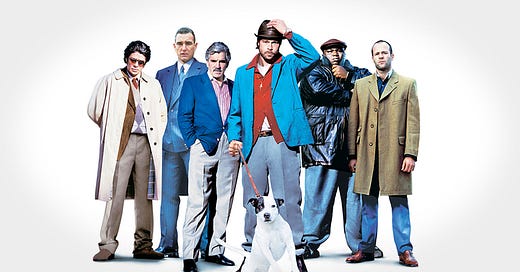Welcome back to Carbon Regrets, where I examine the environmental consequences of choices from my past.
I didn’t vote in 2000. I don’t remember why. I was probably too busy watching the movie Snatch in my dorm room and trying to talk like Brad Pitt. And if you haven’t seen the movie, stop what you’re doing and make it right.
At nineteen, I was emerging from my conservative family bubble, just starting to hear whispers about something called "global warming" in my biology classes. It felt big and important, and probably something our government would tackle.
So I didn’t vote. Because I was watching Snatch.
The Climate Champion We Almost Had
What I didn't grasp at nineteen was the profound difference between these candidates on the issue that is now defining our century.
Al Gore wasn't just another politician with environmental talking points. He'd organized the first congressional hearing on global warming in 1981, nearly two decades before my apathetic voting record. As Vice President, he'd spearheaded climate initiatives and helped broker the 1997 Kyoto Protocol. You know, minor achievements like trying to save the planet.
Gore's 2000 platform is a dream compared to what we have with the Trump administration: tax credits for clean power, renewable energy incentives, $1 billion over 10 years for clean infrastructure, and maintaining America's leadership in international climate cooperation.
George W. Bush? He systematically DOGEd climate progress, and didn’t even have a billionaire henchman to help him out. Within two months of taking office, Bush abandoned his promise to regulate CO2 emissions. On March 28, 2001, he pulled the U.S. out of the Kyoto Protocol, citing economic concerns.
The Lost Decade
Bush's first day in office, his Chief of Staff froze over 50 Clinton-era environmental regulations. Reports emerged of political pressure on scientists to downplay global warming, edited climate documents, and suppressed findings.
During Bush's presidency (2001-2009), U.S. greenhouse gas emissions rose 14% from 1990 levels. Global emissions increased 28% during this critical period, what climate scientists now call a "lost decade."
Research shows that delaying climate action imposes exponentially increasing costs. Meeting a 1.5°C warming target would have cost $1.3 trillion per year globally if action began in 2010, but rises to over $5 trillion per year for action beginning in 2020.
Each decade of delay increases mitigation costs by approximately 40%.
The Leadership Vacuum
Bush's climate retreat created a ripple effect across the globe. European climate efforts lost effectiveness without American participation. China and other developing countries pointed to U.S. inaction as justification for their own limited commitments.
With Gore's leadership, the U.S. could have positioned American companies as global leaders in solar, wind, and storage technologies. Instead, those markets are now dominated by China. Oops. Early investment could have driven down renewable costs faster and strengthened international cooperation.
Where We Might Be Today
As I write this in 2025, with a Trump administration bulldozing our economy and climate progress, we face enormous challenges. Emissions have fallen 14% since 2005, mainly due to natural gas replacing coal and increased renewables. But we've repeatedly entered and exited international climate agreements, undermining global cooperation.
Under a Gore presidency starting in 2001, we might have achieved 30-40% emissions reductions by now instead of modest gains. Sustained U.S. leadership could have kept warming closer to 1.5°C rather than our current trajectory toward 2.5-3°C.
The Supreme Court's 5-4 decision in Bush v. Gore didn't just determine a presidency. It altered the global climate trajectory for decades. Thanks.
A True Personal Failure
When people talk about climate change, they love to focus on personal failings. Did you drive an SUV this week? Use a plastic straw? Forget to bring your reusable bags to the grocery store? Yes, I fucking did all of those things. I guess it’s my fault the planet is on fire.
But there's only one personal failing that truly matters when it comes to climate change: not voting.






